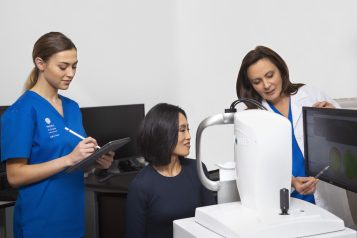 Photo Credit: Shutterstock
Photo Credit: Shutterstock
Oprah Winfrey and Drew Barrymore just had a heart-to-heart conversation on Oprah Daily's "The Life You Want" class about changing our views on menopause - and many were enlightened by it.
Menopause is more than just hot flashes. It can also cause mood swings, vaginal dryness, sleep disturbances, weight gain, and decreased libido, among other symptoms. Additionally, the way menopause affects one person can differ from another due to factors such as genetics, lifestyle, and overall health.
It is crucial to acknowledge that menopause is not a disease but a natural biological process that signifies the end of reproductive years. Despite this, many women still experience shame and embarrassment when discussing menopause, which is why open conversations like the one between Winfrey and Barrymore are so important. Haute MD expert Dr. Deborah Houk breaks down their conversation and explains each aspect from a medical standpoint.
Oprah mentioned that she experienced brain fog during menopause. Can you explain why this happens?
Cognitive problems like brain fog and memory issues are extremely common in women going through menopause. In fact, nearly two-thirds of women report cognitive difficulties (inattentiveness, forgetfulness, issues with recall, word-finding difficulties, and other symptoms) during menopause. Although more research needs to be done, the underlying cause of brain fog during menopause is related to the drop in estrogen. As estrogen levels drop, glucose metabolism in the brain slows, causing a slowing of processing in the brain.
Also, women who experience other common symptoms associated with menopause like depression, fatigue, sleep issues, and night sweats, naturally have mental performance changes due to these symptoms. Therefore, treatment for menopause and support during the menopausal transition is key, as the sooner the hormones settle, the sooner patients can start feeling back to normal.
Oprah mentioned she was experiencing heart palpitations. How common are heart palpitations as a symptom of menopause, and how are they typically managed?
Because of the changing hormone levels, many women experience heart palpitations with menopause, most commonly during hot flashes. Most of the time, the heart palpitations associated with menopause are harmless, and supportive care, behavioral modifications, and treatment for menopause can help. But, if you experience heart palpitations, you should see a doctor to be sure of the underlying diagnosis and proper management.
Oprah talked about the impact of menopause on mental health, including depression and anxiety. How can doctors address mental health concerns during menopause?
As previously discussed, depression is a prevalent symptom of menopause. When combined with sleep disturbances, higher stress levels, and increased fatigue, it can create a perfect storm for even more severe depression and anxiety. To address mental health concerns during menopause, doctors should focus on the whole patient, rather than each symptom in isolation.
By taking a comprehensive approach, doctors can consider the effects of lifestyle on brain health and recommend not only hormonal treatments but also adjunct, non-hormonal treatments like citalopram, desvenlafaxine, escitalopram, gabapentin, paroxetine, or venlafaxine, which are effective for common mental health concerns. In addition, physicians who consider the entire patient can also recommend lifestyle and behavioral modifications that can help, such as stress management, sleep hygiene, healthy nutrition, and regular exercise.
 Photo Credit: Shutterstock
Photo Credit: Shutterstock
Drew Barrymore mentioned feeling stigmatized and self-conscious about her image as a woman going through menopause. How common is this feeling among women experiencing menopause?
It's unfortunate but all too common for women to feel stigmatized when it comes to menopause. There is a pervasive idea that a woman's worth is tied to her ability to bear children, which is scientifically inaccurate and doesn't make sense. Women are incredible beings who contribute to the world in countless ways, regardless of whether they are going through puberty or menopause.
It's important to remember that menopause is a natural biological process that comes with significant changes in both the body and the brain. These changes can lead to feelings of depression, anxiety, and self-consciousness, making it crucial to seek treatment and address these symptoms. Recognizing menopause as a medical diagnosis can help remove the stigma and encourage women to seek the help they need to feel their best.
How important is it for doctors to proactively screen women for menopause and perimenopause, and how can doctors ensure that they are not overlooking these potential diagnoses?
The transition to menopause usually occurs between the ages of 45 and 56. Knowing this and being aware of the many symptoms associated with menopause and perimenopause can help doctors anticipate this diagnosis in their patients. In addition, physicians often do a focused history for patients they want to screen for menopause, finding out when the patient’s mother, aunts, sisters, and other relatives began their menopausal transition also helps as there are genetic components that contribute to symptom onset.
Drew Barrymore mentioned feeling hesitant to discuss menopause with a man she found attractive. How can women feel more comfortable talking about menopause with their partners, friends, and healthcare providers?
Breaking the taboo around menopause is essential, and having open and honest conversations about it with friends, partners, loved ones, and healthcare providers can make a huge difference. Menopause is a natural and significant milestone in life that heralds a transition, and discussing it with family can help you feel supported and gain a deeper understanding of possible genetic components. This understanding can help you prepare for what to expect and make the transition smoother. By talking about menopause more openly, we can help remove the shame and embarrassment surrounding it and empower women to seek the support and resources they need to navigate this phase of life.






















